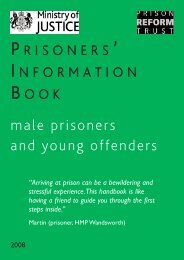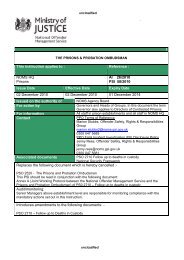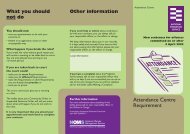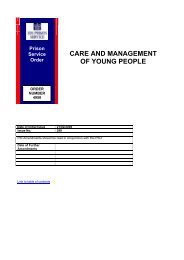Resettlement provision for children and young ... - Ministry of Justice
Resettlement provision for children and young ... - Ministry of Justice
Resettlement provision for children and young ... - Ministry of Justice
Create successful ePaper yourself
Turn your PDF publications into a flip-book with our unique Google optimized e-Paper software.
Case study 12<br />
One looked after child, aged 16, had not known where he would be living at the time <strong>of</strong> our interview. He<br />
assumed it would be at a bed <strong>and</strong> breakfast but had been told that he would find out 10 days be<strong>for</strong>e<br />
release. Accommodation was noted in his training plan as an issue: he had been living with his sister<br />
prior to custody but had broken his curfew arrangements so would not be able to live there again. His<br />
mother <strong>and</strong> sister were attending his training planning meetings <strong>and</strong> he had been given free calls to his<br />
sister to maintain contact. He had been on a fixed-term exclusion from mainstream schooling <strong>and</strong> had<br />
an education statement <strong>for</strong> emotional <strong>and</strong> behavioural difficulties. He had been attending education in<br />
custody <strong>and</strong> had wanted to continue this on release. He also wanted to work with his uncle, who was a<br />
bricklayer, but there were no <strong>for</strong>mal plans in place at the time <strong>of</strong> interview. The case supervisor reported<br />
that he had been released homeless <strong>and</strong> with no ETE arranged. Follow-up in<strong>for</strong>mation on where he was<br />
living a month later was not provided.<br />
Case study 13<br />
One <strong>young</strong> person, aged 17, had no accommodation or ETE plans at the time <strong>of</strong> interview. He said<br />
accommodation had been discussed at training planning meetings: his <strong>of</strong>fence had been against his<br />
mother so he was unable to live with her but independent living was discussed <strong>and</strong> he was happy with<br />
that. The YOT case manager was the lead on arranging accommodation. The case supervisor noted<br />
that, as the <strong>young</strong> person was serving a short sentence (four month DTO), accommodation plans would<br />
not be finalised until his pre-release meeting. The <strong>young</strong> person was not sure what ETE he wanted to<br />
do on release but was thinking about scaffolding. He had had to report as homeless on release <strong>and</strong> had<br />
no ETE arranged. A month later the case supervisor reported that he was on a ‘business in the<br />
community’ course. In<strong>for</strong>mation on where he was living was not provided.<br />
Case study 14<br />
One <strong>young</strong> person, aged 18, had been living with his mother prior to custody <strong>and</strong>, although it was<br />
originally thought he would return there, this was not possible as his <strong>of</strong>fence had been against her. The<br />
<strong>young</strong> person wanted to live with his sister on release but this was unconfirmed at the time <strong>of</strong> interview<br />
– it was dependent on the local authority approving it as one <strong>of</strong> his victims lived in the area. This was<br />
confirmed at his pre-release meeting. While in custody he had been attending education <strong>and</strong> had<br />
passed Catering NVQ Level 1 <strong>and</strong> Food Safety Level 2, which had been set as targets in his training<br />
plan. Plans <strong>for</strong> his release were that he attend college to do Catering NVQ Level 2 <strong>and</strong> the YOT had<br />
arranged a college interview <strong>for</strong> him. He hoped to have a career in catering in the army. A month after<br />
release he was still living with his sister <strong>and</strong> attending the catering course.<br />
Case study 15<br />
One <strong>young</strong> person had been living with a foster carer prior to custody but had since turned 18 so was<br />
unable to return there. He was entitled to leaving care services <strong>and</strong> his social worker had been visiting<br />
to talk to him about accommodation. There was no accommodation arranged at the time <strong>of</strong> the<br />
interview, but his social worker <strong>and</strong> YOT case manager were trying to arrange it. In custody he had<br />
received one to one support <strong>for</strong> ADHD <strong>and</strong> had been studying computer music <strong>for</strong> which he had<br />
achieved a Level 1 qualification. He wanted to continue studying music production on release but this<br />
72

















